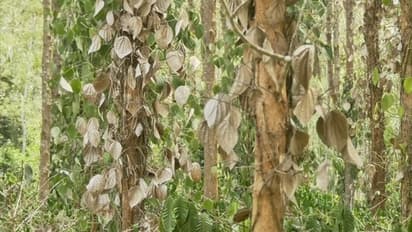Karnataka's Kodagu suffers drought: Crops go dry, farmers express plight as temperature reaches 38 degrees

Synopsis
In Kodagu district, Karnataka, a severe drought has devastated once-thriving coffee plantations and other crops, leaving farmers in distress. Unprecedented in 25 years, the drought has exhausted innovative irrigation methods. Farmers face a bleak six-year wait for crops to mature, compounded by dried-up alternative income sources.
In the scenic Kodagu district of Karnataka, nestled in the lush Malenadu region, a troubling scenario has unfolded this year. Once known for its plenty of rainfall, the area is now grappling with an unexpected drought, leaving farmers in deep distress. The usually, thriving coffee plantations, black pepper vines, and walnut trees have wilted under the scorching sun, posing a severe threat to the livelihoods of many small-scale farmers in the region.
According to farmers, this drought is unlike anything they've witnessed in the past 25 years. Even a decade ago, they managed to sustain their crops by resorting to innovative methods like using drinking water for irrigation and employing drip irrigation systems. However, this year's drought has left their once-prosperous coffee plants and other crops completely dried up, rendering them without any source of income.
Karnataka: 'Scotland of India', Kodagu grapples with excessive heat; Records 35 degrees Celsius!
"We used to harvest coffee worth lakhs every year, but now our fields lie barren," laments one farmer from Sunticoppa, Chikkabetageri, Doddabetageri in the Kushalanagar taluk, a semi-mountainous area hit particularly hard by the drought.
The plight of the farmers is exacerbated by the fact that replanting and nurturing the crops to maturity would take at least six years, during which they will be devoid of any income. The situation is further dire as alternative sources of income, such as the 15 to 20-year-old black pepper vines and the four-year-old walnut saplings have also dried up completely.
Lok Sabha polls 2024: Brides, grooms turn voters in Karnataka’s Kodagu-Chikkamagaluru, Maharashtra’s Amravati
The absence of the usual Monbar rains and soaring temperatures of 36 to 38 degrees Celsius have aggravated the situation. Desperate attempts to salvage the crops, including spending significant sums on pumping water and digging tube wells, have been futile as water sources have dried up.
"I spent everything I had to save my crops, but all in vain," laments a distressed farmer named Rashid. The ramifications of the drought extend beyond individual farmers, shaking the entire agricultural landscape of Kodagu district.
Stay updated with the Breaking News Today and Latest News from across India and around the world. Get real-time updates, in-depth analysis, and comprehensive coverage of India News, World News, Indian Defence News, Kerala News, and Karnataka News. From politics to current affairs, follow every major story as it unfolds. Download the Asianet News Official App from the Android Play Store and iPhone App Store for accurate and timely news updates anytime, anywhere.